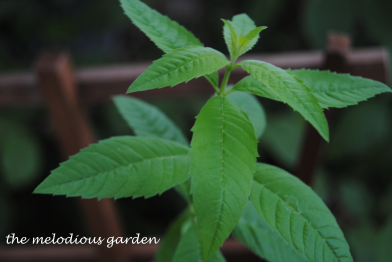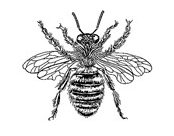I rave about lemon verbena most any chance I get.
Meet a new gardener? I am bound to ask them if they grow lemon verbena, then I will start into a five minute mini-lecture on why everyone should grow the herb.
Talking to an experienced cook about using fresh herbs versus dried herbs in the kitchen? I am likely to start talking about my passion for using lemon verbena.
Discussing flower gardening with a grower at the farmer’s market? Yes. Even then I will recommend lemon verbena.
If the botany world had Super Fans, I would be Lemon Verbena’s biggest fan.
But why lemon verbena when lemon balm is so readily available? Following is a bit of a compare/contrast of the two herbs… (I will leave lemon grass for another day, as that is in a league of its own.)
Let’s start first with a side by side look at the herbs.

This collection of potted plants is right outside my front door, where I can run my fingers through the leaves of the herbs or run outside to snip off a bit of herb for cooking. I grow both lemon verbena and lemon balm in containers, though I will also plant lemon verbena in the ground.
Lemon balm is in the mint family, which means… It would overtake the world if given the chance. I always, always, always plant lemon balm (and mints) in containers. For me, one lemon balm plant is sufficient. It has an impressive root system and will readily spread to fill a container. Or the neighborhood.
Lemon verbena is a woody annual herb, which grows and produces leaves along one central woody stalk. I generally plant half dozen plants each spring, some in containers and some in the ground. I don’t use all that I plant, but it is a lovely carefree addition to the garden. I love the way it tends to sprawl around other plants and I love brushing against its fragrant leaves whenever I am in the garden.
Lemon balm is extremely winter hardy and can survive temperatures up to 20 below. Lemon verbena, however, is frost tender around 30 degrees. I have had a few plants overwinter in sheltered locations in my zone 8a garden, but they are nowhere near as robust as they were the previous year. Likewise, I have overwintered the plants in a container in the garage during cold spells and it comes through just fine, just not as full and lush as a new plant.
The most important comparison, for me, is in the leaves…

Lemon verbena has long, thin leaves with smooth edges. Pinch off a leave and crush it to release the oils and you will smell a cool, refreshing scent. Lemon balm has short leaves with scalloped edges. Crush a lemon balm leaf and you will smell warmth. To me, that is also a great indication of how I use the two herbs. If I want to make lemonade or iced lemon tea, lemon verbena is my go-to. If I want to make a warm cup of tea to soothe a sore throat, lemon balm is my first choice. I also prefer to bake with lemon verbena, as I find it brings a bright zest to most recipes.
Both lemon verbena and lemon balm can be easily dried for winter use. (My preferred lazy drying method is to put a baking rack over a cookie sheet and place the cuttings out flat to dry.)
Likewise, the leaves of both can be used in soap making, tea blends, baking, etc.
My preferred method for using their leaves in baking is to add several leaves (fresh or dried) into the sugar portion of the recipe. Whirl in a food processor to finely mince the leaves and release the oils directly into the sugar. The sugar is then incorporated into the recipe where the scent and taste can be enjoyed throughout.

Lemon verbena will flower, however I am always pinching leaves off so do not get any flowers on my plants. Lemon balm does freely bloom, which the bees and small butterflies enjoy. Lemon balm can and does spread through seeds, in addition to its spreading roots. The photo below shows, just above the center leave, where the lemon balm had earlier bloomed.

Lemon verbena and lemon balm grow in very similar environments. Both do well with adequate water and are not happy with dry conditions. Lemon balm would love an extra drink or two of water, but certainly does not need it. But it is forgiving to occasional over-watering. When grown in a container, allow for good drainage for both herbs. Both herbs prefer a sunny location, but are happy with some afternoon relief in the hottest of Texas summers. Mine are near a large bur oak tree and get bright light in the morning until early afternoon, then a bit of shade until evening.
Now… For the million dollar question… Why do I prefer lemon verbena over lemon balm? I think its leaves are prettier and I love the coolness of its scent. It has more of a crisp summer smell, in my opinion.
Whichever one you plant, I hope that you enjoy experimenting with herbs in your home.


Truly helpful. Thank you.
LikeLike
Thank you for clearing this up for me. I have lots of Lemon Balm all over my gardens (planted by previous owner.) Have not used it yet but am excited to add it to recipies.
LikeLike